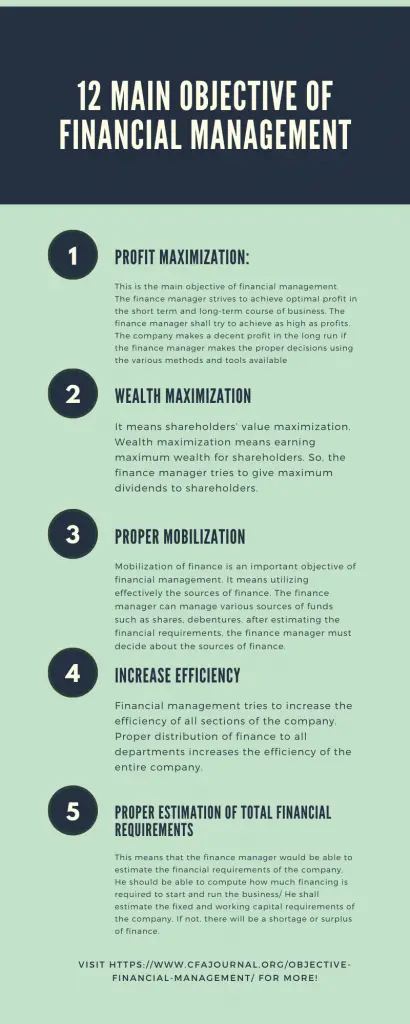Meaning:
Financial management is that managerial activity that is involved in planning and controlling of firm’s financial resources. It is concerned with acquiring, financing, and managing assets to accomplish the overall goal of a business enterprise.
Every beginner needs to start a business or a company with financial knowledge and management strategies. Finance is directly linked to various departments like marketing, production, and personnel.
For any business, it must expect the investments to be made in such a manner that returns are higher than the cost of finance.
In a nutshell, financial management reduces the cost of finance, ensures sufficient availability of funds, and effective utilization of funds.
J.E. Brandley defines financial management as that area of business management devoted to judicious use of capital and carefully selecting the source of capital to enable a spending unit to move in the direction of reaching the goals.
This best-selling financial management book might help you to have a better understanding of financial management.
Objectives:
The main objectives of financial management include profit and wealth maximization, cash flow management, cost efficiency improvement, operating risks management, survival management, and more.
The following are the details of the financial management objective:
- Profit maximization: This is the main objective of financial management. The finance manager strives to achieve optimal profit in the short term and long-term course of business. The finance manager shall try to achieve as high as profits. The company makes a decent profit in the long run if the finance manager makes the proper decisions using the various methods and tools available
- Wealth maximization: It means shareholders’ value maximization. Wealth maximization means earning maximum wealth for shareholders. So, the finance manager tries to give maximum dividends to shareholders. The dividend declaration and payout policy are decided by financial management. Dividend decisions include a proper dividend policy regarding the distribution or retaining of company profits. This is related to the performance of the company. Better the performance, the higher is the market value of shares. In nutshell, the finance manager tries to maximize shareholders’ value.
- Proper mobilization: Mobilization of finance is an important objective of financial management. It means utilizing effectively the sources of finance. The finance manager can manage various sources of funds such as shares, and debentures, after estimating the financial requirements, the finance manager must decide about the sources of finance.
- Increase efficiency: Financial management tries to increase the efficiency of all sections of the company. Proper distribution of finance to all departments increases the efficiency of the entire company.
- Proper estimation of total financial requirements: This means that the finance manager would be able to estimate the financial requirements of the company. He should be able to compute how much financing is required to start and run the business/ He shall estimate the fixed and working capital requirements of the company. If not, there will be a shortage or surplus of finance. The finance manager shall use various factors like the technology used by the company, the number of employees used, the scale of operations, and legal requirements.
- Proper utilization of finance: The finance manager must make optimum utilization of finance. This can be done by using various financial tools such as managing receivables, effective payment policy in hand, and better inventory management.
- Maintaining proper cash flow: The financial manager shall ensure that there is a regular supply of liquidity in the company monitoring closely all the cash inflows and outflows reducing the instances of underflow and overflow of cash. The finance manager is entrusted with the responsibility to maintain an optimum level of liquidity. Healthy cash flow improves the chances of survival and success of the company.
- Survival of company: The company must survive in this competitive business world. Hence, the finance manager shall take all the decisions intuitively. The big decisions shall be taken with proper due diligence and consultancy with consultants.
- Creating reserves: The higher the reserves, the better it will be for the company to overcome uncertainty. The company shall have an optimal dividend payout policy that will help itself to create reserves over the year. It must also keep the profits as reserves. The reserves can be used for the expansion of the company and for overcoming uncertainty. It can also be used to face contingencies in the future.
- Reduce the cost of capital: This includes risk evaluation, measuring the cost of capital, and estimating the benefits of a particular project. Managers are responsible for deciding how available funds should be invested in fixed or current assets to get the best available returns.
- Reduce operating risks: The company goes through various risks and uncertainties. The finance manager must take steps to reduce these risks. This can be done by avoiding high-risk allocation of capital for expansion All the decisions shall be taken with proper consultancy.
- Prepare capital structure: This means bringing a proper balance between the different sources of capital. This balance is necessary for liquidity, economy, flexibility, and stability.

